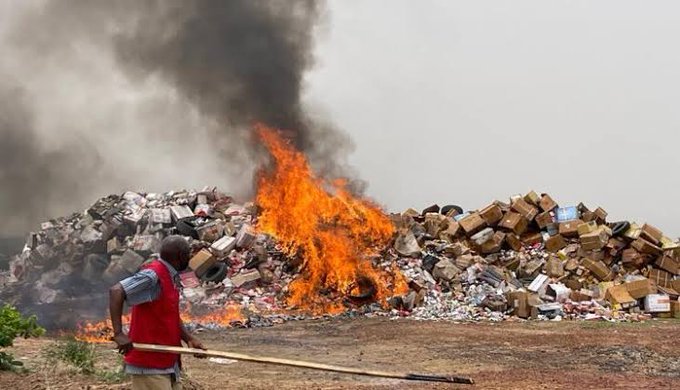NAFDAC Destroys ₦15 Billion Worth of Fake, Expired Drugs in Oyo State — A Major Blow to Counterfeit Medicines
Ibadan — The National Agency for Food and Drug Administration and Control (NAFDAC) has destroyed unwholesome, substandard, falsified, and expired drugs and medical products valued at ₦15 billion at the Moniya dumpsite in Ibadan, Oyo State. The agency described the operation as critical to preventing re-entry of dangerous pharmaceuticals into the Nigerian market.
The destruction exercise, which took place on a Wednesday in October 2025, was conducted under the oversight of NAFDAC’s Director-General, Professor Mojisola Adeyeye. She was represented at the event by Dr. Martins Iluyomade, the Director of Investigation and Enforcement for the agency. The aim of the operation, as stated, is to eliminate dangerous counterfeit, expired, and banned drugs that pose severe risks to public health.
What Was Destroyed
According to NAFDAC, the destroyed items included a broad range of regulated but illicit or compromised products. These consist of:
- Counterfeit, unregistered, and banned medicines
- Expired medical products and vaccines
- Controlled substances such as Tramadol
- Codeine-containing cough syrups
- Analgin
- Co-codamol
- Oxytocin
Also destroyed were products seized during recent nationwide raids on black-market sellers, counterfeiters, and unlicensed outlets. Among these was a container falsely labelled as diclofenac, which was discovered to contain anti-malaria drugs. The shipment included 277 cartons exceeding 100,000 tablets.
NAFDAC also reported seizing illegally manufactured cosmetics and packaging materials, including from a military barracks in Lagos, as part of enforcement operations.
Scale & Significance
The scale of fraud and substandard pharmaceutical activity is highlighted by the street value of the destroyed items: more than ₦15 billion. This magnitude underscores persistent weaknesses in regulatory compliance, gaps in enforcement, and the urgency of stronger controls around importation, storage, distribution, and sale of medical products.
NAFDAC’s assertion is that many of these products were either bypassing proper regulatory channels or were outright illegal — unregistered, unlicensed, expired, or banned — increasing the risk of adverse health outcomes, including treatment failures, drug resistance, poisoning, or worse.
Who Was Behind the Operation & Enforcement Partnerships
The destruction event was supported by collaboration among several agencies:
- NAFDAC’s Investigation & Enforcement Directorate
- Nigeria Customs Service (for seizures of smuggled goods)
- Nigeria Police Force
- Nigerian Army
- Department of State Services (DSS)
- Pharmacists Council of Nigeria (PCN)
NAFDAC has also noted that in previous operations, support from the National Security Adviser was instrumental in deploying over 1,000 security personnel for raids in open drug markets.
Public Health Implications
The destroyed medicines and products represent more than just financial loss — they pose serious public health risks. Some of the specific hazards include:
- Use of expired vaccines or improperly stored medical products can jeopardize immunization programmes.
- Counterfeit or substandard cough syrups, analgesics and narcotics may lead to overdoses, therapeutic failure or serious side effects.
- Unlabelled or mislabelled drugs, especially those claiming to be something they are not (e.g. a diclofenac container actually holding anti-malaria medication), can cause dangerous drug interactions, misdiagnoses, or resistance to treatments.
Authorities warn that the ongoing presence of such products in markets could undermine public trust in health systems, worsen disease control efforts (for example in malaria or infectious disease), and contribute to higher morbidity and mortality.
Challenges Revealed
This incident reveals several ongoing challenges in Nigeria’s pharmaceutical regulatory environment:
- Supply chain vulnerabilities — Smuggled products, illicit importation, mislabelling, inadequate storage and oversight.
- Market infiltration by unlicensed sellers — Open-market drug outlets, unregistered distributorships, and black-market channels are continuing sources of counterfeit or expired products.
- Enforcement capacity — While NAFDAC has taken strong action, the scale of seizures suggests the illicit drug trade is large and persistent.
- Public awareness gaps — Consumers may not always be aware of how to verify whether drugs are registered, expired, or properly stored, increasing risk.
Responses & Measures Going Forward
Following the destruction, NAFDAC, under Prof. Adeyeye, has issued calls to various stakeholders to deepen the fight against fake and expired drugs:
- Encouraging public vigilance, urging community leaders, healthcare professionals, religious leaders, journalists, to educate the public about dangers of buying from unlicensed sellers.
- Agencies are increasing their enforcement operations, with more raids, seizures, and inspections.
- Legal actions: suspects linked to seized shipments are expected to face prosecution as a deterrent.
- Collaboration among regulatory, law enforcement, customs, and public health agencies to tighten borders, storage controls, and licensing.
Context: Previous Large-Scale Destructions
This isn’t the first time NAFDAC has carried out high-value drug destructions in Oyo State and beyond. Some previous operations include:
- Destruction of fake, expired, substandard drugs worth ₦100 billion in Ibadan during three-week enforcement operations involving multiple markets.
- Earlier operations destroyed products worth ₦11 billion in 2024, collected from several South-West states and Kwara, including unregistered, smuggled, or expired products.
These recurring events illustrate both the magnitude of the problem and NAFDAC’s ongoing activism.
Editorial Analysis: Why This Destruction Matters
Destruction of counterfeit and expired drugs is more than symbolic. It signals important movement on:
- Regulatory integrity — Ensuring that the laws, standards, and registration systems for pharmaceuticals are enforced.
- Health security — A nation’s public health depends heavily on the safety, efficacy, and integrity of medicines and vaccines. Removing dangerous products helps avoid drug resistance, treatment failures and possible outbreaks.
- Public confidence — When citizens see regulators taking strong action, trust in medicines and formal healthcare providers improves.
- Economic implications — The counterfeit drug trade erodes revenue, harms legitimate manufacturers, raises healthcare costs (through failed treatments or adverse effects), and undermines foreign investment in pharma.
What Nigerians Should Know & Do
To stay safe, experts are advising Nigerians to:
- Only purchase medicines from registered pharmacies and outlets where licensing is clearly displayed.
- Check for NAFDAC registration numbers, batch numbers, expiry dates, and packaging integrity.
- Avoid buying from street hawkers, vehicle kiosks, or dubious open markets where drug packaging or labeling seems off.
- Report suspected fake, expired, or unwholesome drugs to NAFDAC or through official hotlines.
- Work with healthcare professionals to verify treatments, especially for prescription drugs.
Conclusion
The destruction of over ₦15 billion worth of fake, expired, unregistered, and dangerous drugs in Oyo State stands as a strong message: Nigeria’s regulators are intensifying efforts to protect public health. However, recurring large-scale seizures reflect a market with deep, systemic issues — porous borders, weak distribution channels, inadequate oversight, and consumer vulnerabilities.
As NAFDAC continues to pull dangerous products from streets, docks, open markets, and fake outlets, the fight against counterfeit drugs remains a marathon, not a sprint. For the regulatory bodies, health professionals, law enforcement, and ordinary citizens, sustained vigilance and collective action are essential to secure Nigeria’s pharmaceutical supply chain and uphold the health of the nation.













